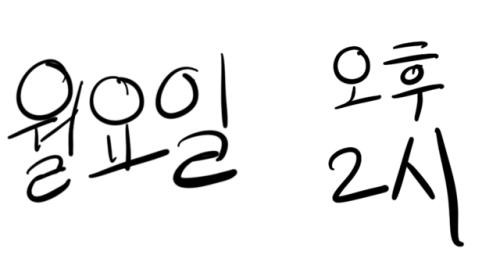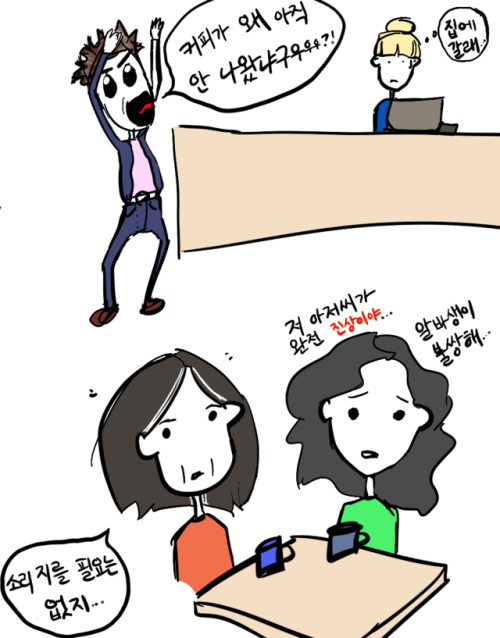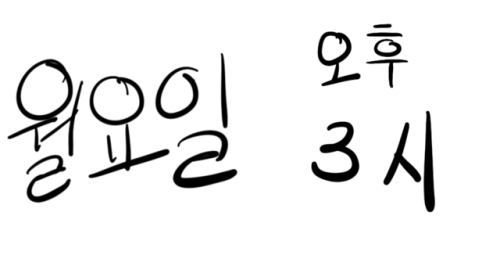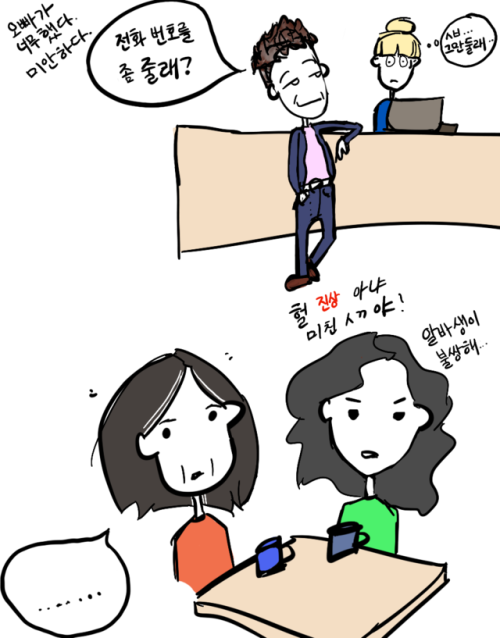#korean vocabulary
CAREERS IN KOREAN 1
- 일하다 — to work
- 이력서 — resume / curriculum
- 사무실 — office
- 월급 — salary
- 혜택 — benefits / perks
study on: quizlet
RELATIONSHIPS IN KOREAN 2
- 조부모님 — grandparents
- (외)할머니 — maternal grandmother
- (친)할머니 — paternal granmother
- 입양 (외 · 친)할머니 — adoptive grandmother
- 입양 (외 · 친)할아버지 — adoptive grandfather
- (외)할아버지 — maternal grandfather
- (친)할아버지 — paternal grandfather
study on: quizlet
RELATIONSHIPS IN KOREAN 1
- 관계[들] — relation(s), relationship(s)
- 친구[들] — friend(s)
- 가족 — family
- 부모 · 부모님 — parents (honorific)
- 사랑하다 — to love
study on: quizlet
EOJETBAM-STUDIES’ FIVE A DAY 10
- 빌라 — villa
- 식료품 — groceries
- 관리비 — maintenance fee
- 전세 · 월세 — rent (big deposit · monthly)
- 주차 — parking
study on: quizlet
EOJETBAM-STUDIES’ FIVE A DAY 9
- 싫어하다 — to hate
- 싶다 — to want / to wish / to desire
- 집 — house / home
- 아파트 — apartment
- 오피스텔 — oficetel
study on: quizlet
EOJETBAM-STUDIES’ FIVE A DAY 8
- 카페 — coffee shop
⤷ 커피숍 — coffee shop (alternative) - 커피 — coffee
- 바리스타 — barista
- 주문 — order / spell
- 좋아하다 — to like
study on: quizlet
EOJETBAM-STUDIES’ FIVE A DAY 7
- 경찰관 — police officer
- 공무원 — government worker / public worker
- 정부 — government
- 대사관 — embassy
- 대사 — ambassador
study on: quizlet
EOJETBAM-STUDIES’ FIVE A DAY 6
- 도서관 — library
- 병원 — hospital
- 의사 — doctor
- 경찰 — police
- 경찰서 — police station
study on: quizlet
EOJETBAM-STUDIES’ FIVE A DAY 5
- 회사 — company
- 회사원 — employee / office worker
- 학교 — school
- 학생 — student
- 선생님 — teacher
study on: quizlet
오늘은 바로 제헌절입니다. 제헌절은 1948년 7월 17일에 헌법이 제정된 것을 기념하는 국경일입니다. 원래는 공휴일이었으나 현재는 비공휴일의 국경일입니다. 한반도는 1945년 8월 15일에 일본제국으로부터 해방되었으나 냉전과 남북 간의 갈등 때문에 헌법을 제정하는 데 몇년 걸렸습니다.
헌법 – Constitution
제정되다 – be enacted/established
국경일 – national holiday
공휴일 – public holiday/bank holiday (day off)
한반도 – Korean peninsula
해방되다 – be liberated
냉전 – Cold War
갈등 – conflict/tension
learn korean : the lazy way
you may have already been in that situation where you’re trying to communicate with a native korean via texts but somehow aren’t able to distinguish some words because they’re written a certain way. well as well as in english or any other languages korean also has its lazy way of using it. we’ll see some words in their correct form and then in their “lazy/text” form.
이렇게 (like this) : 이러케
그렇게 (like that) : 그러케
어떻게 (how) : 어떠케, 어케
왜 이/그렇게 (why are u so…) : 왤케
그렇구나 (i see) : 그러구나
~고 싶다 (to want) : 고시퍼
귀엽다 (to be cute) : 겹다
- conjugated : 귀여워->기어워/여워,키여워/어워
괜찮아 (its okay) : 괜차나,갠차나
싫어 (to hate) : 시러
맞아 (to be right, correct) : 마자
전화 (phone) : 저나
~잖아:자나
미안해 (to be sorry) : 미아내, 먄
ㄱㄱ (고고) : let’s go
ㄴㄴ (노노) : no
ㄷㅊ (닥쳐) : shut up
ㅇㅋ (오키) : okay
ㅂㅇ (바이) : bye
ㅎㅇ (하이) : hi
ㅇㅈ (인정) : i admit
ㄱㅅ (감사) : thanks
A new Korean video is up! I talk about some Korean words that people often confuse (including myself!). I put so much effort into making aesthetically pleasing editing, hahaha, so I hope y’all like it!!
Today’s word is 진상. This isn’t really word that you use everyday, but I love this word. You can find it in the “open” never dictionary under 진상 손님 (rude customer). It’s a slang word, often shortened to “진상” to refer to a rude customer, but it’s a bit stronger. It’s kind of between a normal word and a swear word.
For example, someone who is yelling, rudely asking for a manager, throwing things, swearing, or passive aggressively harassing the employees. It’s even someone who is too drunk in a restaurant. It’s basically someone who makes the employee’s life harder.
Here is a translation of the little comic.
First picture.
월요일 오후 2시 Monday 2PM
커피가 왜 아직 안 나왔냐구우우우?! (I asked) why hasn’t my coffee come ooout?!
집에 갈래…I wanna go home.
저 아저씨가 완전 진상이야..That man is such a rude-ass customer.
알바생이 불쌍해…That poor part-timer.
소리 지를 필요는 없지…Yeah, there is no need to yell.
알바생이 불쌍하다 literally means “the part-time worker is pitiable,” but I think that English speakers tend to say “poor part-timer/poor kid/poor girl” a lot more often in the same context. Korean uses both 불쌍한 알바생 (poor part-timer) and 알바생이 불쌍하다 quite often.
Second picture.
월요일 오후 3시 Monday 3PM
오빠가 너무 했다. 미안하다. (I) Big brother was a little too much. Sorry.
전화 번호를 좀 줄래? Would you give me your number?
ㅅㅂ 그만둘래…F**k I wanna quit…
헐 진상 아냐, 미친 ㅅㄲ야! Oh my god…he isn’t a rude customer. He’s a crazy bastard.
ㅅㅂ and ㅅㄲ are both ways of censoring Korean swear words in webtoons or texts. Many webtoons have to be clean to some extent because children can read them, so authors often avoid censorship by using the first letter of each syllable in the swear word or some variation of the pronunciation.
People don’t always want to swear, so it’s pretty common in texts too. My friends use these shortened phrases quite often in text, and use the full words when they really mean it haha. ㅅㅂ is close to the F word, and ㅅㄲ is like a bastard, but it’s used more often than the English word “bastard" in my opinion. 미친 person (crazy person) also has a much more negative nuance in Korean. So, it’s actually much stronger than it’s English counterpart. I’d be a little more careful using it.
Here are some more examples of 진상.
어제 카페에서 알바했을 때 진상이 와서 너무 힘들었어요. I had such a hard time when I was working at my part-time job in a cafe yesterday because some jerk customer came in.
내 친구가 말해줬는데 저 사람 진짜 진상이래. My friend told me this, but (she says) that guy over there is a super rude customer.
커피가 잘못 나왔지만..그냥 마시지 뭐..진상 떨기 싫어. My coffee came out wrong, but…I’m just going to drink it…I don’t want to act like a rude customer.
진상 떨다 is a slang for “to act like a rude customer.”
Follow me for more Korean lessons and tips.
Post link




